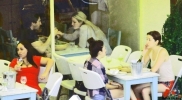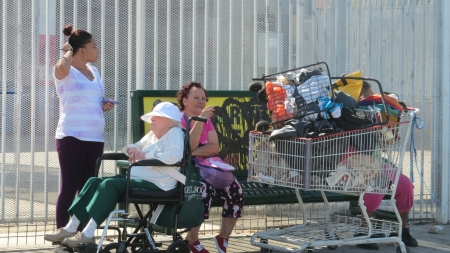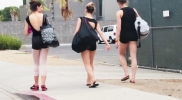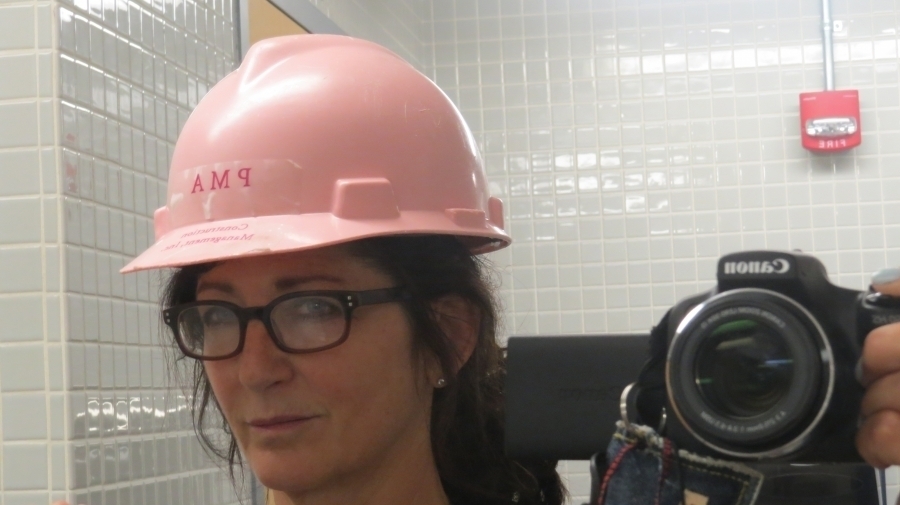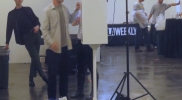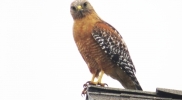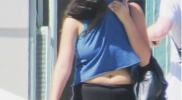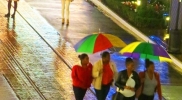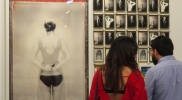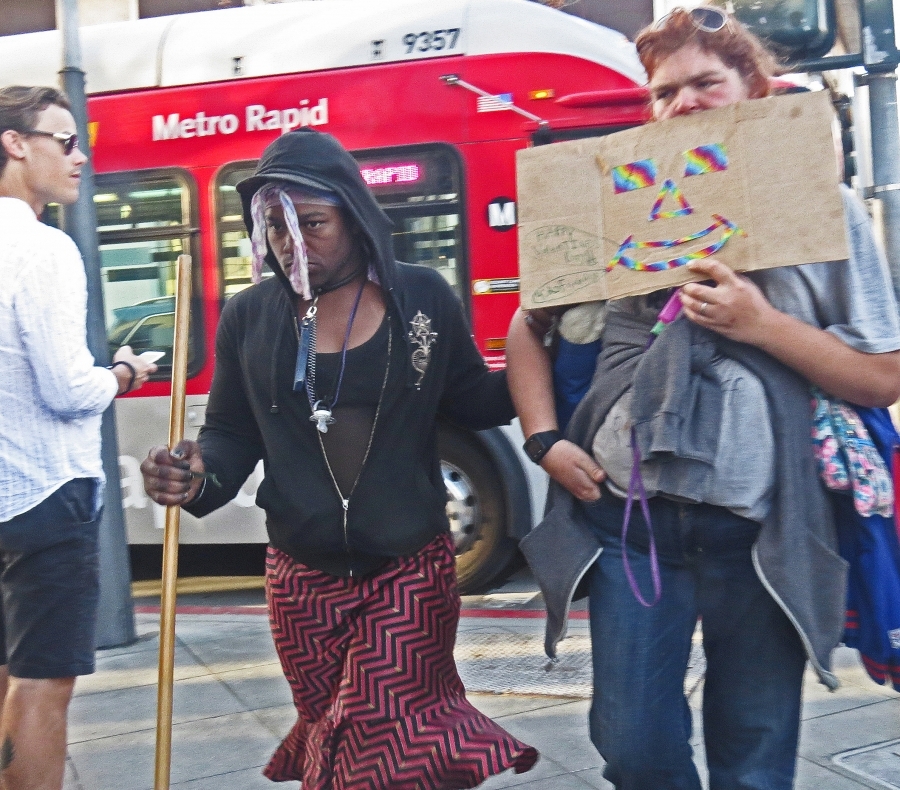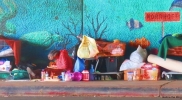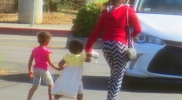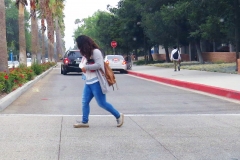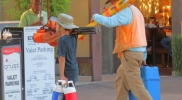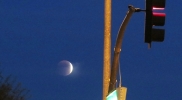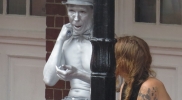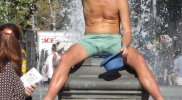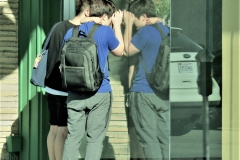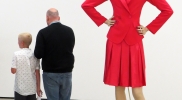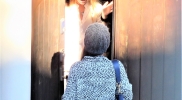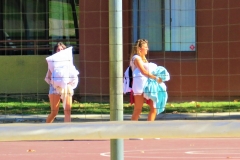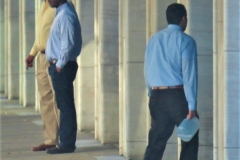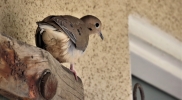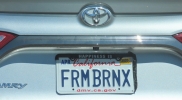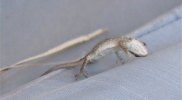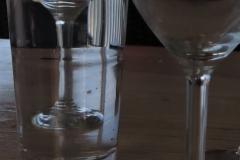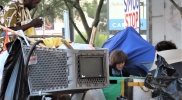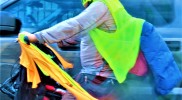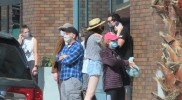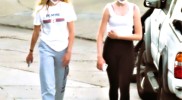|
|
Best Poems - Attire
Best Poems – ATTIRE, HAIR & MAKEUP
|
| Recipe For A Tattoo – Rosie Angelica Alonso
“Look for a spot on your skin that you think will do:
Behind the ear for a small, crooked rose
that reminds you of your ex-novia
Along the jawline for the area code of your hood
to let them vatos know how firme you really are.
Trace the chosen spot with your fingers to show Mamá
where the name of a new lover will be.
Set the timer for how many times she shakes her head and calls you a mensa.
Separately mix the amarillos, azules, and black inks
’til well blended and test it like you would
a can of spray paint on the side wall of your vecino’s house.
Place your tongue on an ounce of chiles rojos.
Power your electric needle.
Intensity: bien chingón.
Stare into the sun for thirty seconds. No llores.
Apply ice on the cherry blossoms along your ankle,
swollen like bruised plums after stumbling on heels
during a night at the bar with the cuatas.
Gaze at the heart tattoo on your ring finger
smudged during a three-month engagement,
a kiss behind a grimy East L.A. chapel on 1st Street.
Cut three leaves of yerba buena from the yard and rub on the eyes until dry.
Mix a teaspoon of limón with a shot of tequila.
Drink it.
You said you’d never ge the L.A. symbol
but you get not one but two porque… why not?
Go Dodgers.
You remember how you swore to Diosito
how you wouldn’t get any skulls on your arms either
(well, at least some have flowers, mom).
Preheat any regret to 400 degrees, depending on the thickness.
Take a shot of tequila and consider another long-term commitment.
Repeat from step one.” |
|
|
| Naming the Fabrics – Julia Alvarez
“Mother, unroll the bolts and name
the fabrics from which our clothing came,
dress the world in vocabulary:
broadcloth, corduroy, gingham, terry.
Gingham and calico, crepe and gauze,
gabardine, organdy, wool, madras,
fabrics, Mother, name them all:
jersey, chambray, satin, voile.
‘Give me a yard of that dotted swiss,
satin to rein in my junior miss
with a crimson sash and a show-off bow,
or schoolclothes yards of calico.
‘Course I’d like some permanent press
with four daughters and a man to dress—
I’ve got them down to a set of numbers
though the girls keep inching out of their jumpers.
‘I’d like a lick of that wedge of velvet—
rich as a bar of chocolate fudge.
I can see him through the sheer chiffon
sigh at the girls he sowed as sons.
‘All the better! Four sets of hands
to puzzle the squares on a yard of lawn,
outline in chalk, then satin-stich
the monograms on his handkerchiefs.
‘Broadcloth, Herringbone, Oxford, Cheviot,
Seersucker, Duck: his suits are cut
from proud cloths whose names suggest
coats of arms and the shroud of conquest.
‘My girls were cut out of different cloths—
my legs scissoring with love
(they’re old enough to hear it said)
on the muslin sheets of the homemade bed.
‘My eldest is jersey, a sensible fabric,
to make up for the second, a pretty dramatic
damask! The third is genuine kersey.
My baby, a finicky dimity.
‘As for me, if I had to pick,
I’d be a reversible fabric,
on the worn-out side, a wife and mother,
a brand-new woman on the other!
‘With wash-and-wear marquisette legs and feet,
organdy thighs, a thin tricot waist,
a chambray bodice and brocade breasts,
no-iron plisse for my face.’
Mother, be made of marquisette,
brocade, plisse. And when your spirit
discards itself from the spindle spine,
may your clothes be hung on the washday line.
May the sleeves fill with windy limbs,
and the busts bulge with a sudden gust,
the hips indulge in the fattening wind,
and the snap of the breeze be the thump of the pulse.
Four sets of hands will tend to you
For although your being has fallen through
the sieve of these fabrics, still you live
as the damp lap dries and the tight seams give
in the gingham, calico, crepe and gauze,
gabardine, organdy, wool, madras,
selves, Mother, you’ve worn them all:
jersey, chambray, satin, voile.”
|
|
|
Nothing to Wear – William Allen Butler
“Miss Flora McFlimsey, of Madison Square,
Has made three separate journeys to Paris,
And her father assures me, each time she was there,
That she and her friend Mrs. Harris
(Not the lady whose name is so famous in history,
But plain Mrs.H., without romance or mystery)
Spent six consecutive weeks without stopping,
In one continuous round of shopping;—
Shopping alone, and shopping together,
At all hours of the day, and in all sorts of weather;
For all manner of things that a woman can put
On the crown of her head or the sole of her foot,
Or wrap round her shoulders, or fit round her waist,
Or that can be sewed on, or pinned on, or laced,
Or tied on with a string, or stitched on with a bow,
In front or behind, above or below:
For bonnets, mantillas, capes, collars, and shawls;
Dresses for breakfasts, and dinners, and balls;
Dresses to sit in, and stand in, and walk in;
Dresses to dance in, and flirt in, and talk in;
Dresses in which to do nothing at all;
Dresses for winter, spring, summer, and fall;—
All of them different in color and pattern,
Silk, muslin, and lace, crepe, velvet, and satin,
Brocade, and broadcloth, and other material,
Quite as expensive and much more ethereal:
In short, for all things that could ever be thought of,
Or milliner, modiste, or tradesman be bought of,
From ten-thousand-francs robes to twenty-sous frills;
In all quarters of Paris, and to every store,
While McFlimsey in vain stormed, scolded, and swore,
They footed the streets, and he footed the bills.
The last trip, their goods shipped by the steamer Argo
Formed, McFlimsey declares, the bulk of her cargo,
Not to mention a quantity kept from the rest,
Sufficient to fill the largest sized chest,
Which did not appear on the ship’s manifest,
But for which the ladies themselves manifested
Such particular interest, that they invested
Their own proper persons in layers and rows
Of muslins, embroideries, worked under-clothes,
Gloves, handkerchiefs, scarfs, and such trifles as those;
Then, wrapped in great shawls, like Circassian beauties,
Gave good-by to the ship, and go-by to the duties.
Her relations at home all marveled, no doubt,
Miss Flora had grown so enormously stout
For an actual belle and a possible bride;
But the miracle ceased when she turned inside out,
And the truth came to light, and the dry goods beside,
Which, in spite of Collector and Custom-house sentry,
Had entered the port without any entry.
And yet, though scarce three months have passed since the day
The merchandise went, on twelve carts, up Broadway,
This same Miss McFlimsey, of Madison Square,
The last time we met, was in utter despair,
Because she had nothing whatever to wear!
NOTHING TO WEAR!
Now, as this is a true ditty,
I do not assert—this, you know, is between us—
That she ‘s in a state of absolute nudity,
Like Powers’ Greek Slave, or the Medici Venus;
But I do mean to say I have heard her declare,
When, at the same moment she had on a dress
Which cost five hundred dollars, and not a cent less,
And jewelry worth ten times more, I should guess,
That she had not a thing in the wide world to wear!
I should mention just here, that out of Miss Flora’s
Two hundred and fifty or sixty adorers,
I had just been selected as he who should throw all
The rest in the shade, by the gracious bestowal
On myself, after twenty or thirty rejections,
Of those fossil remains which she called ‘her affections,’
And that rather decayed, but well-known work of art,
Which Miss Flora persisted in styling ‘her heart.’
So we were engaged. Our troth had been plighted,
Not by moonbeam or starbeam, by fountain or grove;
But in a front parlor, most brilliantly lighted,
Beneath the gas-fixtures we whispered our love.
Without any romance, or raptures, or sighs,
Without any tears in Miss Flora’s blue eyes,
Or blushes, or transports, or such silly actions,
It was one of the quietest business transactions,
With a very small sprinkling of sentiment, if any,
And one very large diamond imported by Tiffany.
On her virginal lips while I printed a kiss,
She exclaimed, as a sort of parenthesis,
And by way of putting me quite at my ease,
‘You know, I’m to polka as much as I please,
And flirt when I like—now stop, don’t you speak—
And you must not come here more than twice in the week,
Or talk to me either at party or ball;
But always be ready to come when I call:
So don’t prose to me about duty and stuff,
If we don’t break this off, there will be time enough
For that sort of thing; but the bargain must be
That, as long as I choose, I am perfectly free—
For this is a kind of engagement, you see,
Which is binding on you but not binding on me.’
Well, having thus wooed Miss McFlimsey, and gained her,
With the silks, crinolines, and hoops that contained her,
I had, as I thought, a contingent remainder
At least in the property, and the best right
To appear as its escort by day and by night;
And it being the week of the Stuckup’s grand ball—
Their cards had been out a fortnight or so,
And set all the Avenue on tiptoe,—
I considered it only my duty to call,
And see if Miss Flora intended to go.
I found her—as ladies are apt to be found,
When the time intervening between the first sound
Of the bell and the visitor’s entry is shorter
Than usual—I found; I won’t say I caught her—
Intent on the pier-glass, undoubtedly meaning
To see if perhaps it didn’t need cleaning.
She turned as I entered—‘Why, Harry, you sinner,
I thought that you went to the Flashers’ to dinner!’
‘So I did,’ I replied, ‘but the dinner is swallowed,
And digested, I trust, for ’tis now nine and more:
So being relieved from that duty, I followed
Inclination, which led me, you see, to your door;
And now will your ladyship so condescend
As just to inform me if you intend
Your beauty, and graces, and presence to lend,
(All which, when I own, I hope no one will borrow)
To the Stuckup’s, whose party, you know is to-morrow?’
The fair Flora looked up with a pitiful air,
And answered quite promptly, “Why Harry, mon cher,
I should like above all things to go with you there;
But really and truly—I’ve nothing to wear.’
‘NOTHING TO WEAR!
Go just as you are:
Wear the dress you have on, and you’ll be by far,
I engage, the most bright and particular star
On the Stuckup horizon’—I stopped, for her eye,
Notwithstanding this delicate onset of flattery,
Opened on me at once a most terrible battery
Of scorn and amazement. She made no reply,
But gave a slight turn to the end of her nose—
(That pure Grecian feature), as much as to say,
‘How absurd that any sane man should suppose
That a lady would go to a ball in the clothes,
No matter how fine, that she wears every day!’
So I ventured again—‘Wear your crimson brocade’—
(Second turn-up of nose)—‘That’s too dark by a shade.’
‘Your blue silk’—‘That’s too heavy;’ ‘Your pink’—‘That’s too light.’
‘Wear tulle over satin,’—‘I can’t endure white.’
‘Your rose-colored, then, the best of the batch’—
‘I haven’t a thread of point lace to match.’
‘Your brown moire-antique“—‘Yes, and look like a Quaker.’
‘The pearl-colored’—‘I would, but that plaguy dress-maker
Has had it a week’—‘Then the exquisite lilac,
In which you would melt the heart of a Shylock.’
(Here the nose took again the same elevation)—
‘I wouldn’t wear that for the whole of creation.’
‘Why not? It’s my fancy, there’s nothing could strike it
As more comme il faut—‘ ‘Yes, but dear me, that lean
Sophronia Stuckup has got one just like it,
And I won’t appear dressed like a chit of sixteen.”
‘Then that splendid purple, that sweet Mazarine;
That superb point d’aiguille, that imperial green,
That zephyr-like tarletan, that rich grenadine‘—
‘Not one of all which is fit to be seen,’
Said the lady, becoming excited and flushed.
‘Then wear,’ I exclaimed, in a tone which quite crushed
Opposition, ‘that gorgeous toilette which you sported
In Paris last spring, at the grand presentation,
When you quite turned the head of the head of the nation;
And by all the grand court were so very much courted.’
The end of the nose was portentously tipped up,
And both the bright eyes shot forth indignation,
As she burst upon me with fierce exclamation,
‘I have worn it three times at the least calculation,
And that and most of my dresses are ripped up!’
Here I ripped out something, perhaps rather rash,
Quite innocent, though; but, to use an expression
More striking than classic, it ‘settled my hash,’
And proved very soon the last act of our session.
‘Fiddlesticks, is it, Sir? I wonder the ceiling
Doesn’t fall down and crush you—you men have no feeling;
You selfish, unnatural, illiberal creatures,
Who set yourselves up as patterns and preachers.
Your silly pretense—why what a mere guess it is!
Pray, what do you know of a woman’s necessities?
I have told you and shown you I’ve nothing to wear,
And it’s perfectly plain you not only don’t care,
But you do not believe me’—(here the nose went still higher)—
‘I suppose if you dared you would call me a liar.
Our engagement is ended, Sir—yes, on the spot;
You’re a brute, and a monster, and—I don’t know what.’
I mildly suggested the words Hottentot,
Pickpocket, and cannibal, Tartar, and thief,
As gentle expletives which might give relief;
But this only proved as a spark to the powder,
And the storm I had raised came faster and louder;
It blew and it rained, thundered, lightened, and hailed
Interjections, verbs, pronouns, till language quite failed
To express the abusive, and then its arrears
Were brought up all at once by a torrent of tears,
And my last faint, despairing attempt at an obs-
Ervation was lost in a tempest of sobs.
Well, I felt for the lady, and felt for my hat, too,
Improvised on the crown of the latter a tattoo,
In lieu of expressing the feelings which lay
Quite too deep for words, as Wordsworth would say:
Then, without going through the form of a bow,
Found myself in the entry—I hardly know how,
On doorstep and sidewalk, past lamp-post and square,
At home and up stairs, in my own easy-chair;
Poked my feet into slippers, my fire into blaze,
And said to myself, as I lit my cigar,
‘Supposing a man had the wealth of the Czar
Of the Russians to boot, for the rest of his days,
On the whole, do you think he would have much time to spare
If he married a woman with nothing to wear?”
Researches in some of the ‘Upper Ten’ districts
Reveal the most painful and startling statistics,
Of which let me mention only a few:
In one single house, on the Fifth Avenue,
Three young ladies were found, all below twenty-two.
Who have been three whole weeks without anything new
In the way of flounced silks, and thus left in the lurch
Are unable to go to ball, concert, or church.
In another large mansion, near the same place,
Was found a deplorable, heart-rending case
Of entire destitution of Brussels point-lace.
In a neighboring block there was found, in three calls,
Of total want, long continued, of camel’s-hair shawls;
And a suffering family, whose case exhibits
The most pressing need of real ermine tippets;
One deserving young lady almost unable
To survive for the want of a new Russian sable;
Still another, whose tortures have been most terrific
Ever since the sad loss of the steamer Pacific.
In which were engulfed, not friend or relation
(For whose fate she perhaps might have found consolation,
Or borne it, at least, with serene resignation),
But the choicest assortment of French sleeves and collars
Ever sent out from Paris, worth thousands of dollars,
And all as to style most recherché and rare,
The want of which leaves her with nothing to wear,
And renders her life so drear and dyspeptic
That she’s quite a recluse, and almost a skeptic,
For she touchingly says that this sort of grief
Cannot find in Religion the slightest relief,
And Philosophy has not a maxim to spare
For victims of such overwhelming despair.
But the saddest, by far, of all these sad features
Is the cruelty practiced upon the poor creatures
By husbands and father, real Bluebeards and Timons,
Who resist the most touching appeals made for diamonds
By their wives and their daughters, and leave them for days
Unsupplied with new jewelry, fans, or bouquets,
Even laugh at their miseries whenever they have a chance,
And deride their demands as useless extravagance.
One case of a bride was brought to my view,
Too sad for belief, but, alas! ‘t was too true,
Whose husband refused, as savage as Charon,
To permit her to take more than ten trunks to Sharon.
The consequence was, that when she got there,
At the end of three weeks she had nothing to wear.
And when she proposed to finish the season
At Newport, the monster refused, out and out,
For his infamous conduct alleging no reason,
Except that the waters were good for his gout;
Such treatment as this was too shocking, of course,
And proceedings are now going on for divorce.
But why harrow the feelings by lifting the curtain
From these scenes of woe? Enough, it is certain,
Has here been disposed to stir up the pity
Of every benevolent heart in the city,
And spur up Humanity into a canter
To rush and relieve these sad cases instanter.
Won’t somebody, moved by this touching description,
Come forward to-morrow and head a subscription?
Won’t some kind philanthropist, seeing that aid is
So needed at once by these indigent ladies,
Take charge of the matter? Or won’t Peter Cooper
The corner-stone lay of some new splendid super-
Structure, like that which to-day links his name
In the Union unending of Honor and Fame,
And found a new charity just for the care
Of these unhappy women with nothing to wear,
Which, in view of the cash which would daily be claimed,
The Laying-out Hospital well might be named?
Won’t Stewart, or some of our dry-goods importers,
Take a contract for clothing our wives and our daughters?
Or, to furnish the cash we supply these distresses,
And life’s pathway strew with shawls, collars, and dresses,
For poor womankind, won’t some venturesome lover
A new California somewhere discover?
O ladies, dear ladies, the next sunny day
Please trundle your hoops just out of Broadway,
From its whirl and its bustle, its fashion and pride,
And the temples of Trade which tower on each side,
To the alleys and lanes, where Misfortune and Guilt
Their children have gathered, their city have built;
Where Hunger and Vice, like twin beasts of prey,
Have hunted their victims to gloom and despair;
Raise the rich, dainty dress, and the fine broidered skirt,
Pick your delicate way through the dampness and dirt,
Grope through the dark dens, climb the rickety stair
To the garret, where wretches, the young and the old,
Half starved and half naked, lie crouched from the cold;
See those skeleton limbs, those frost-bitten feet,
All bleeding and bruised by the stones of the street;
Hear the sharp cry of childhood, the deep groans that swell
From the poor dying creature who writhes on the floor;
Hear the curses that sound like the echoes of hell,
As you sicken and shudder and fly from the door;
Then home to your wardrobes, and say, if you dare—
Spoiled children of fashion—you’ve nothing to wear!
And O, if perchance there should be a sphere
Where all is made right which so puzzles us here,
Where the glare and the glitter and tinsel of Time
Fade and die in the light of that region sublime,
Where the soul, disenchanted of flesh and of sense,
Unscreened by its trappings and shows and pretense,
Must be clothed for the life and the service above,
With purity, truth, faith, meekness, and love,
O daughters of Earth! foolish virgins, beware!
Lest in that upper realm you have nothing to wear!” |
|
|
| Taking Off Emily Dickinson’s Clothes – Billy Collins
“First, her tippet made of tulle,
easily lifted off her shoulders and laid
on the back of a wooden chair.
And her bonnet,
the bow undone with a light forward pull.
Then the long white dress, a more
complicated matter with mother-of-pearl
buttons down the back,
so tiny and numerous that it takes forever
before my hands can part the fabric,
like a swimmer’s dividing water,
and slip inside.
You will want to know
that she was standing
by an open window in an upstairs bedroom,
motionless, a little wide-eyed,
looking out at the orchard below,
the white dress puddled at her feet
on the wide-board, hardwood floor.
The complexity of women’s undergarments
in nineteenth-century America
is not to be waved off,
and I proceeded like a polar explorer
through clips, clasps, and moorings,
catches, straps, and whalebone stays,
sailing toward the iceberg of her nakedness.
Later, I wrote in a notebook
it was like riding a swan into the night,
but, of course, I cannot tell you everything—
the way she closed her eyes to the orchard,
how her hair tumbled free of its pins,
how there were sudden dashes
whenever we spoke.
What I can tell you is
it was terribly quiet in Amherst
that Sabbath afternoon,
nothing but a carriage passing the house,
a fly buzzing in a windowpane.
So I could plainly hear her inhale
when I undid the very top
hook-and-eye fastener of her corset
and I could hear her sigh when finally it was unloosed,
the way some readers sigh when they realize
that Hope has feathers,
that reason is a plank,
that life is a loaded gun
that looks right at you with a yellow eye.” |
|
|
| Red – Countee Cullen
“She went to buy a brand new hat
And she was ugly, black, and fat:
‘This red becomes you well,’ they said,
And perched it high upon her head.
And then they laughed behind her back
To see it glow against the black.
She paid for it with regal mien,
And walked out proud as any queen.” |
|
|
| Please Don’t Sit Like a Frog, Sit Like a Queen – Denise Duhamel
– graffiti inside the cubicle of a ladies’ bathroom in a university in
the Philippines
“Remember to pamper, remember to preen.
The world doesn’t reward a pimply girl.
Don’t sit like a frog, sit like a queen.
Buy a shampoo that makes your locks sheen.
If your hair is straight, get it curled.
Remember to pamper, remember to preen.
Keep your breath minty and your teeth white and clean.
Paint your nails so they glisten, ten pearls.
Don’t sit like a frog, sit like a queen.
Smile, especially when you’re feeling mean.
Keep your top down when you take your car for a whirl.
Remember to pamper, remember to preen.
Don’t give in to cravings, you need to stay lean
So you can lift up your skirt as you prance and twirl.
Don’t sit like a frog, sit like a queen.
Don’t marry the professor, marry the dean.
Marry the king, don’t marry the earl.
Remember to pamper, remember to preen.
Don’t sit like a frog, sit like a queen.” |
|
|
| August – Louise Glück
“My sister painted her nails fuchsia,
a color named after a fruit.
All the colors were named after foods:
coffee frost, tangerine sherbet.
We sat in the backyard, waiting for our lives to resume
the ascent summer interrupted:
triumphs, victories, for which school
was a kind of practice.
The teachers smiled down at us, pinning on the blue ribbons.
And in our heads, we smiled down at the teachers.
Our lives were stored in our heads.
They hadn’t begun; we were both sure
we’d know when they did.
They certainly weren’t this.
We sat in the backyard, watching our bodies change:
first bright pink, then tan.
I dribbled baby oil on my legs, my sister
rubbed polish remover on her left hand,
tried another color.
We read, we listened to the portable radio.
Obviously this wasn’t life, this sitting around
in colored lawn chairs.
Nothing matched up to the dreams.
My sister kept trying to find a color she liked:
it was summer, they were all frosted.
Fuchsia, orange, mother-of-pearl.
She held her left hand in front of her eyes,
moved it from side to side.
Why was it always like this—
the colors so intense in the glass bottles,
so distinct, and on the hand
almost exactly alike,
a film of weak silver.
My sister shook the bottle. The orange
kept sinking to the bottom; maybe
that was the problem.
She shook it over and over, held it up to the light,
studied the words in the magazine.
The world was a detail, a small thing not yet
exactly right. Or like an afterthought, somehow
still crude or approximate.
What was real was the idea:
My sister added a coat, held her thumb
to the side of the bottle.
We kept thinking we would see
the gap narrow, though in fact it persisted.
The more stubbornly it persisted,
the more fiercely we believed.” |
| The Science of Wearing a Dress – Kendra Hamilton
“Something there is in every woman
that wants a grand entrance, craves it.
Far more than chocolate or red moiré silk
worse than a kiss from Montgomery Clift.
She’ll stand for hours grappling with perplexity
at Tootsie’s two-for-one cocktail dress sale.
All around her bugle beads are snapping off
hangers with a music like computerized pinball
and women, smiling gamely or grimly,
are maneuvering their way about the racks
with a sinuous yet unapplauded grace
like that of pickup ballplayers pirouetting under a hoop.
At moments like these what’s uppermost
in her mind is not the face of the man
who asked her to the ball—but whether to rip
up the phone bill, buy those Ferragamos
half-price at Diamanté’s on Main.
Ravishing shoes the color of sea foam
with stiletto heels she just knows
will strike sparks off a stone-flagged step.
Yes, something there is in every woman
standing rooted in a dress shop
that knows the night will be hers,
that every Japanese lantern on every rooftop
in Dallas will be lit just for her
and that Susan Hayward hip snap she worked
three months to perfect will get a tryout
after all—this night—with ‘the one.’
Though he, not being such a one as can interpret
the arcane cricket whisperings of nylons
in the ladies room, will never know
what it cost her, or how she chose to pay.” |
|
|
| The Poetry of Dress – Robert Herrick
“A sweet disorder in the dress
Kindles in clothes a wantonness:—
A lawn about the shoulders thrown
Into fine distraction,—
An erring lace, which here and there
Enthrals the crimson stomacher,—
A cuff neglectful, and thereby
Ribbands to flow confusedly,—
A winning wave, deserving note,
In the tempestuous petticoat,—
A careless shoe-string, in whose tie
I see a wild civility,—
Do more bewitch me, than when art
Is too precise in every part.“ |
|
|
| Dressed Up – Langston Hughes
“I had ma clothes cleaned
Just like new.
I put ’em on but
I still feels blue.
I bought a new hat,
Sho is fine,
But I wish I had back that
Old gal o’ mine.
I got new shoes
They don’t hurt ma feet,
But I ain’t got nobody
For to call me sweet.” |
| You Were Wearing – Kenneth Koch
“You were wearing your Edgar Allan Poe printed cotton blouse.
In each divided up square of the blouse was a picture of Edgar Allan Poe.
Your hair was blonde and you were cute. You asked me, ‘Do most boys think that most girls are bad?’
I smelled the mould of your seaside resort hotel bedroom on your hair held in place by a John Greenleaf Whittier clip.
‘No,’ I said, ‘it’s girls who think that boys are bad.’ Then we read Snowbound together.
And ran around in an attic, so that a little of the blue enamel was scraped off my George Washington, Father of His Country, shoes.
Mother was walking in the living room, her Strauss Waltzes comb in her hair. We waited for a time and then joined her, only to be served tea in cups painted with pictures of Herman Melville.
As well as with illustrations from his book Moby Dick and from his novella, Benito Cereno.
Father came in wearing his Dick Tracy necktie: ‘How about a drink, everyone?’
I said, ‘Let’s go outside a while.’ Then we went onto the porch and sat on the Abraham Lincoln swing.
You sat on the eyes, mouth, and beard part, and I sat on the knees.
In the yard across the street we saw a snowman holding a garbage can lid mashed into a likeness of the mad English king, George the Third.” |
| An Etiquette for Eyes – Cate Marvin
“I don’t know
if I wore glasses
when I met you
but I know
the last time
I saw you you
drank a drink
I bought you
with another
woman who
was far uglier
than I have
ever been. I have brown eyes, did I ever tell you?
Your eyes are too too blue, tell-all awful, and too
too pretty; you make all the girls swoon, and then
lament how harpies pound on your door, plucking
the very shingles off your roof, conducting through
their unanimous will a plot to kill your hive’s queen,
fix a hose from the car’s tailpipe to pump barnyard
dread straight into your ken, therefore you demand
I ought never wish to lie in your bed. I have black eyes,
did I tell you? But your eyes are damp blue, fingers in
winter blue, worrying about a prom date blue, never
washed a dish blue. Have I mentioned my eyes are
dead brown, dirt brown, stone brown, done with you
brown, screaming out in the streets I’m so drunk brown,
I’m just ignoring the noise rising up from streets asleep
brown? As in, as brown as dead leaves because my love’s
eyes were dead brown and when he shouted down at
that drunk on the street that New Year’s Eve from
my third f!oor window that drunk man called him
Whiskey Whore Boy. And his eyes were not wish-
wash blue, his eyes were mostly moss and trees,
not mojitos in a barroom, no, his eyes all gin-lit in
a hotel room on our last night were ice-cold, even
in his farewell he was bold, his eyes anyone might
have called plain, but they could at least cry. I am
sick to death of your blue eyes, fabric eyes, flower
eyes. I have brown eyes, plain and saying eyes behind
thick frames, glassy eyes handing themselves over
to you in buckets eyes, dig your hands into my black
soil eyes, my ugly eyes reaching into your eyes for
my twin eyes, look back at me eyes while your eyes
crawl the walls, cloud-blue, wandering off as milky
bosomed maids will look away from the eyes that
seek the crevices deep between their heavy breasts
that sway beneath the cows they bend to milk eyes.
Won’t you have another drink from my silty yonder
eyes? I may look
plain but I’ve got
roses in my blood,
can bloom right
out the soil of these
here brackish eyes,
wander a limb across
the chest of your
country, unlock
the footlocker of your
desire with the tip
of my vine eyes.” |
|
|
| Does this Poem Make My Butt Look Big? – Erin Murphy
“Maybe these words are
too loose
dimply and jiggling like cellulite
like my friend’s hind parts
that can’t keep
up with her girls’ bird legs Maybe
these words
need a girdle some wonder garment
squeezing everything
in its place form-fitting and
corset-tight as a quatrain
something invented by and for
a man.” |
|
|
Haircut – Karl Shapiro
"O wonderful nonsense of lotions of Lucky Tiger,
Of savory soaps and oils of bottle-bright green,
The gold of liqueurs, the unguents of Newark and Niger,
Powders and balms and waters washing me clean,
In mirrors of marble and silver I see us forever
Increasing, decreasing the puzzles of luminous spaces
As I turn, am revolved and am pumped in the air on a lever,
With the backs of my heads in chorus with all of my faces.
Scissors and comb are mowing my hair into neatness,
Now pruning my ears, now smoothing my neck like a plain;
In the harvest of hair and the chaff of powdery sweetness
My snow-covered slopes grow dark with the wooly rain.
And the little boy cries, for it hurts to sever the curl,
And we too are quietly bleating to part with our coat.
Does the barber want blood in a dish? I am weak as a girl,
I desire my pendants, the fatherly chin of a goat.
I desire the pants of a bear, the nap of a monkey
Which trousers of friction have blighted down to my skin.
I am bare as a tusk, as jacketed up as a flunkey,
With the chest of a moth-eaten camel growing within.
But in death we shall flourish, you summer-dark leaves of my head,
While the flesh of the jaw ebbs away from the shores of my teeth;
You shall cover my sockets and soften the boards of my bed
And lie on the flat of my temples as proud as a wreath."
|
|
The Lady’s Dressing Room – Jonathan Swift
“Five hours, (and who can do it less in?)
By haughty Celia spent in dressing;
The goddess from her chamber issues,
Arrayed in lace, brocades and tissues.
Strephon, who found the room was void,
And Betty otherwise employed,
Stole in, and took a strict survey,
Of all the litter as it lay;
Whereof, to make the matter clear,
An inventory follows here.
And first a dirty smock appeared,
Beneath the armpits well besmeared.
Strephon, the rogue, displayed it wide,
And turned it round on every side.
On such a point few words are best,
And Strephon bids us guess the rest,
But swears how damnably the men lie,
In calling Celia sweet and cleanly.
Now listen while he next produces
The various combs for various uses,
Filled up with dirt so closely fixt,
No brush could force a way betwixt.
A paste of composition rare,
Sweat, dandruff, powder, lead and hair;
A forehead cloth with oil upon’t
To smooth the wrinkles on her front;
Here alum flower to stop the steams,
Exhaled from sour unsavory streams,
There night-gloves made of Tripsy’s hide,
Bequeathed by Tripsy when she died,
With puppy water, beauty’s help
Distilled from Tripsy’s darling whelp;
Here gallypots and vials placed,
Some filled with washes, some with paste,
Some with pomatum, paints and slops,
And ointments good for scabby chops.
Hard by a filthy basin stands,
Fouled with the scouring of her hands;
The basin takes whatever comes
The scrapings of her teeth and gums,
A nasty compound of all hues,
For here she spits, and here she spews.
But oh! it turned poor Strephon’s bowels,
When he beheld and smelled the towels,
Begummed, bemattered, and beslimed
With dirt, and sweat, and earwax grimed.
No object Strephon’s eye escapes,
Here petticoats in frowzy heaps;
Nor be the handkerchiefs forgot
All varnished o’er with snuff and snot.
The stockings why should I expose,
Stained with the marks of stinking toes;
Or greasy coifs and pinners reeking,
Which Celia slept at least a week in?
A pair of tweezers next he found
To pluck her brows in arches round,
Or hairs that sink the forehead low,
Or on her chin like bristles grow.
The virtues we must not let pass,
Of Celia’s magnifying glass.
When frightened Strephon cast his eye on’t
It showed visage of a giant.
A glass that can to sight disclose,
The smallest worm in Celia’s nose,
And faithfully direct her nail
To squeeze it out from head to tail;
For catch it nicely by the head,
It must come out alive or dead.
Why Strephon will you tell the rest?
And must you needs describe the chest?
That careless wench! no creature warn her
To move it out from yonder corner;
But leave it standing full in sight
For you to exercise your spite.
In vain the workman showed his wit
With rings and hinges counterfeit
To make it seem in this disguise
A cabinet to vulgar eyes;
For Strephon ventured to look in,
Resolved to go through thick and thin;
He lifts the lid, there needs no more,
He smelled it all the time before.
As from within Pandora’s box,
When Epimetheus op’d the locks,
A sudden universal crew
Of human evils upwards flew;
He still was comforted to find
That Hope at last remained behind;
So Strephon lifting up the lid,
To view what in the chest was hid.
The vapors flew from out the vent,
But Strephon cautious never meant
The bottom of the pan to grope,
And foul his hands in search of Hope.
O never may such vile machine
Be once in Celia’s chamber seen!
O may she better learn to keep
Those ‘secrets of the hoary deep!’
As mutton cutlets, prime of meat,
Which though with art you salt and beat
As laws of cookery require,
And toast them at the clearest fire;
If from adown the hopeful chops
The fat upon a cinder drops,
To stinking smoke it turns the flame
Pois’ning the flesh from whence it came,
And up exhales a greasy stench,
For which you curse the careless wench;
So things, which must not be expressed,
When plumped into the reeking chest,
Send up an excremental smell
To taint the parts from whence they fell.
The petticoats and gown perfume,
Which waft a stink round every room.
Thus finishing his grand survey,
Disgusted Strephon stole away
Repeating in his amorous fits,
Oh! Celia, Celia, Celia shits!
But Vengeance, goddess never sleeping
Soon punished Strephon for his peeping;
His foul imagination links
Each Dame he sees with all her stinks:
And, if unsavory odors fly,
Conceives a lady standing by:
All women his description fits,
And both ideas jump like wits:
But vicious fancy coupled fast,
And still appearing in contrast.
I pity wretched Strephon blind
To all the charms of female kind;
Should I the queen of love refuse,
Because she rose from stinking ooze?
To him that looks behind the scene,
Satira’s but some pocky queen.
When Celia in her glory shows,
If Strephon would but stop his nose
(Who now so impiously blasphemes
Her ointments, daubs, and paints and creams,
Her washes, slops, and every clout,
With which he makes so foul a rout)
He soon would learn to think like me,
And bless his ravished sight to see
Such order from confusion sprung,
Such gaudy tulips raised from dung.”
|
|
|
|
Blond – Natasha Trethewey
“Certainly it was possible—somewhere
in my parents’ genes the recessive traits
that might have given me a different look:
not attached earlobes or my father’s green eyes,
but another hair color—gentleman-preferred,
have-more-fun blond. And with my skin color,
like a good tan—an even mix of my parents’—
I could have passed for white.
When on Christmas day I woke to find
a blond wig, a pink sequined tutu,
and a blond ballerina doll, nearly tall as me,
I didn’t know to ask, nor that it mattered,
if there’d been a brown version. This was years before
my grandmother nestled the dark baby
into our crèche, years before I’d understand it
as primer for a Mississippi childhood.
Instead, I pranced around our living room
in a whirl of possibility, my parents looking on
at their suddenly strange child. In the photograph
my mother took, my father—almost
out of the frame—looks on as Joseph must have
at the miraculous birth: I’m in the foreground—
my blond wig a shining halo, a newborn likeness
to the child that chance, the long odds,
might have brought.”
|
Choosing Shoes – ffrida Wolfe
“New shoes, new shoes,
Red and pink and blue shoes.
Tell me, what would you choose,
If they’d let us buy?
Buckle shoes, bow shoes,
Pretty pointy-toe shoes,
Strappy, cappy low shoes;
Let’s have some to try.
Bright shoes, white shoes,
Dandy-dance-by-night shoes,
Perhaps-a-little-tight shoes,
Like some? So would I.
But
Flat shoes, fat shoes,
Stump-along-like-that shoes,
Wipe-them-on-the-mat shoes,
That’s the sort they’ll buy.”
|
Comments are closed.
|
|
